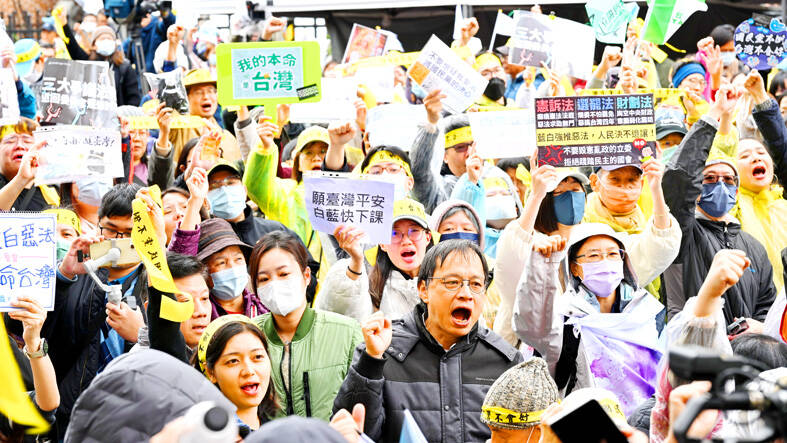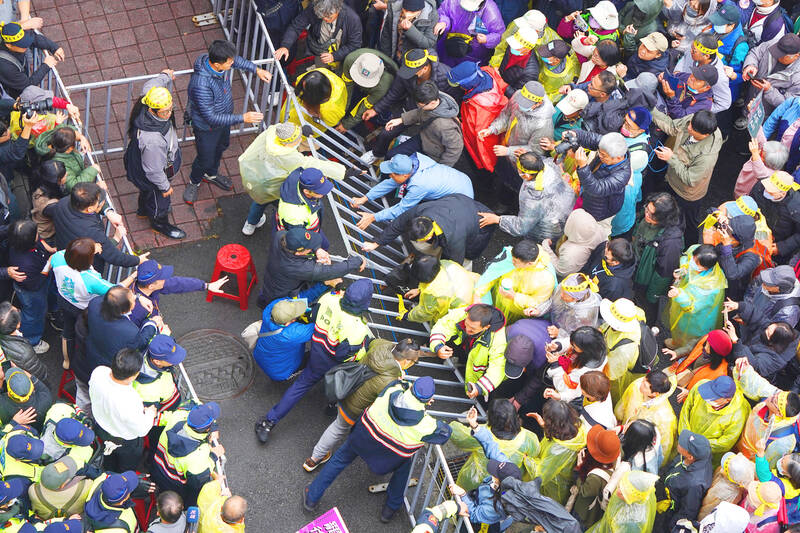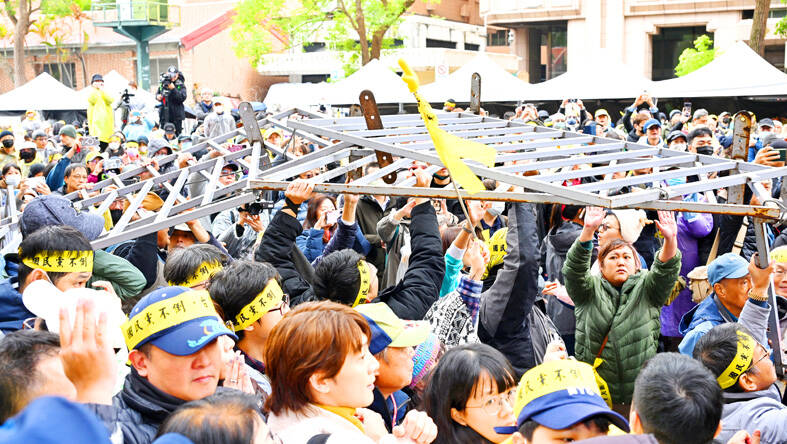“Bluebird movement” groups yesterday tried but failed several times to break into the Legislative Yuan as they sought to disrupt opposition legislators’ attempt to pass amendments to laws governing the recalling of elected officials, the Constitutional Court and government revenue.
Smaller protests were also held in Taichung and Kaohsiung against the proposed amendments to the Public Officials Election and Recall Act (公職人員選舉罷免法), the Constitutional Court Procedure Act (憲法訴訟法) and the Act Governing the Allocation of Government Revenues and Expenditures (財政收支劃分法).
Speeches began at the protests in the morning, with organizers saying more than 15,000 people were at the Taipei rally by evening.

Photo: Chen Yi-kuan, Taipei Times
Protesters removed metal barricades in clashes with police at about 11:30am as they tried to access the Legislative Yuan from a side entrance on Jinan Road, a move reminiscent of the Sunflower movement 10 years ago.
After 4pm, groups at the front entrance on Zhongshan S Road attempted to get inside, but were repelled by police.
Among the protesters was independence advocate Rishen Wu (吳日昇), who said that strong coordinated efforts are needed like when Sunflower movement protesters in 2014 climbed over the gates to occupy the main legislative chamber to stop the Chinese Nationalist Party (KMT) “from dismantling Taiwan’s democracy.”

Photo: CNA
It was the third day of protests against the attempts to pass the three amendments.
Dubbed the “Bluebird wintertime action,” the protests were organized by Taiwan Citizen Front and the Economic Democracy Union, with other groups, independence advocates and members of small political parties, including the New Power Party (NPP), the Taiwan Statebuilding Party, the Green Party and the Taiwan Obasang Political Equality Party attending.
“We have seen violent conduct and violation of proper procedures by the KMT, led by caucus whip Fu Kun-chi (傅?萁),” Economic Democracy Union convener Lai Chung-chiang (賴中強) told reporters in the afternoon. “Ramming through votes on third readings is Fu’s way, which he copies from the Chinese Communist Party.”

Photo: Chen Yi-kuan, Taipei Times
“We want to thank all Democratic Progressive Party [DPP] legislators for laying their bodies in harm’s way to try and stop the voting,” Lai added. “While the three bills will likely pass their third readings, we must fight on to defend Taiwan’s freedom and democracy. So I urge the DPP to appeal for legal injunctions and file for constitutional interpretations on these three bills.”
NPP Chairwoman Claire Wang (王婉諭) on social media called on protesters to stay overnight at the legislature “to show people’s anger about such abuse of power.”
Cabinet spokeswoman Michelle Lee (李慧芝) said that Premier Cho Jung-tai (卓榮泰) appreciates that people took to the streets to safeguard democracy and hopes that Legislative Speaker Han Kuo-yu (韓國瑜) could put aside controversial bills that make people anxious.
More than 100 people gathered at Taichung Railway Station holding placards saying: “We are here to protect Taiwan,” “Down with the KMT bill to undermine the Constitutional Court” and “against the expenditure bill for disbursing funds locally to win elections.”
Dozens assembled at a park in Kaohsiung, carrying placards accusing the KMT of using “martial law tactics.”

The Grand Hotel Taipei on Saturday confirmed that its information system had been illegally accessed and expressed its deepest apologies for the concern it has caused its customers, adding that the issue is being investigated by the Ministry of Justice Investigation Bureau. The hotel said that on Tuesday last week, it had discovered an external illegal intrusion into its information system. An initial digital forensic investigation confirmed that parts of the system had been accessed, it said, adding that the possibility that some customer data were stolen and leaked could not be ruled out. The actual scope and content of the affected data

‘LIKE-MINDED PARTNER’: Tako van Popta said it would be inappropriate to delay signing the deal with Taiwan because of China, adding he would promote the issue Canadian senators have stressed Taiwan’s importance for international trade and expressed enthusiasm for ensuring the Taiwan-Canada trade cooperation framework agreement is implemented this year. Representative to Canada Harry Tseng (曾厚仁) in an interview with the Central News Agency (CNA) said he was increasingly uneasy about Ottawa’s delays in signing the agreement, especially as Ottawa has warmed toward Beijing. There are “no negotiations left. Not only [is it] initialed, we have three versions of the text ready: English, French and Mandarin,” Tseng said. “That tells you how close we are to the final signature.” Tseng said that he hoped Canadian Prime Minister Mark Carney

President William Lai (賴清德) yesterday bestowed one of Taiwan’s highest honors on Saint Vincent and the Grenadines (SVG) Ambassador Andrea Clare Bowman in recognition of her contributions to bilateral ties. “By conferring the Order of Brilliant Star with Grand Cordon on Ambassador Bowman today, I want to sincerely thank her, on behalf of the Taiwanese people, for her outstanding contribution to deepening diplomatic ties between Taiwan and SVG,” Lai said at a ceremony held at the Presidential Office in Taipei. He noted that Bowman became SVG’s first ambassador to Taiwan in 2019 and

POSITIVE DEVELOPMENT: Japan and the US are expected to hold in-depth discussions on Taiwan-related issues during the meeting next month, Japanese sources said The holding of a Japan-US leaders’ meeting ahead of US President Donald Trump’s visit to China is positive news for Taiwan, former Japan-Taiwan Exchange Association representative Hiroyasu Izumi said yesterday. After the Liberal Democratic Party’s landslide victory in Japan’s House of Representatives election, Japanese Prime Minister Sanae Takaichi is scheduled to visit the US next month, where she is to meet with Trump ahead of the US president’s planned visit to China from March 31 to April 2 for a meeting with Chinese President Xi Jinping (習近平). Japan and the US are expected to hold in-depth discussions on Taiwan-related issues during the